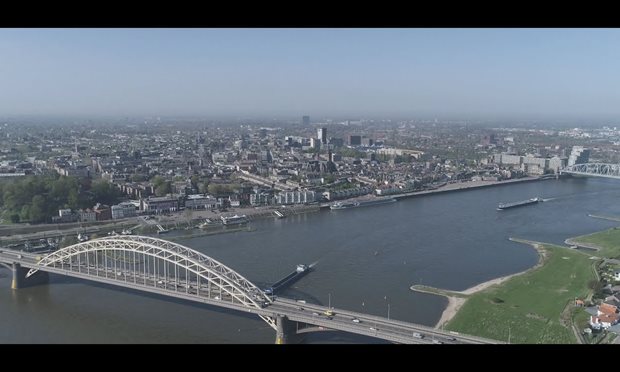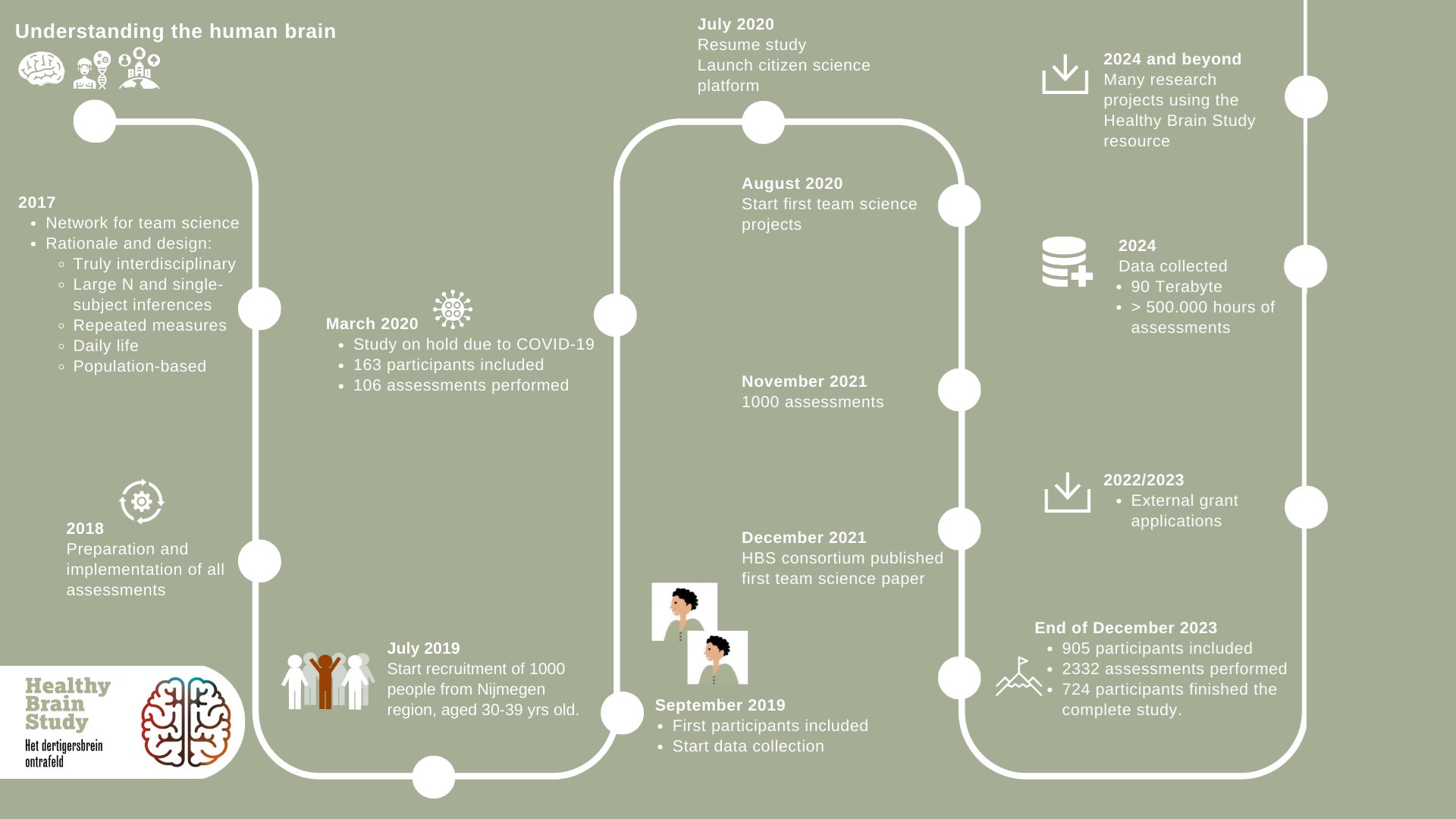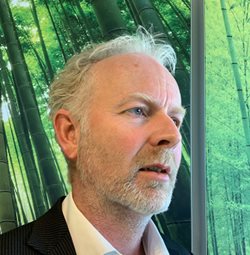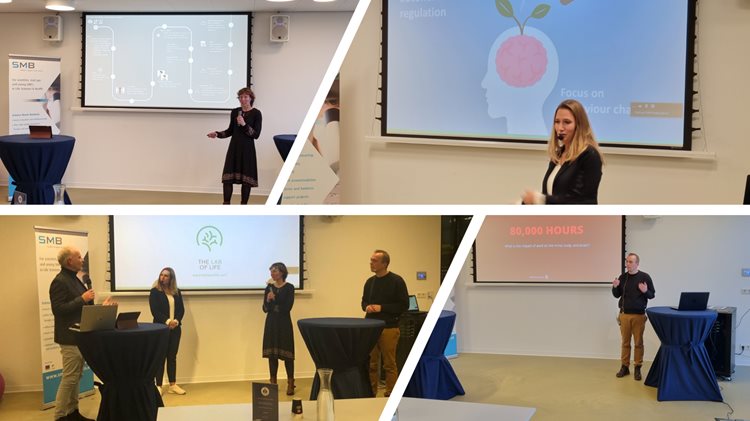

About the study
We want to understand the brain better. The Healthy Brain Study hopes to answer many questions about our brain in daily life.
Read moreAbout the study
We have a dream! Our goal is to discover how the brain works and how the brain effects our daily lives. The Healthy Brain Study hopes to answer these questions. This is a unique, long-term study carried out by Radboud University, Radboudumc and the Max Planck Institute for Psycholinguistics, together with other organizations, and volunteers in their thirties.
Why choose a hamburger over a salad? How does a certain food ingredient influence your mood and your decision to buy a new car? How does sitting and sleeping influence the way you deal with stress? What makes you decide to buy a house and which street to live on? Do you feel better in a relationship or on your own? What determines whether you feel happy? In short, why do people do what they do? The brain plays a major role in these types of questions. The more we know about the brain, the more questions we can answer about how we function in our daily lives. That's why Radboud University, Radboudumc and the Max Planck Institute for Psycholinguistics are working together on this special study that aims to unravel the ‘thirties brain’.
What influences the brain?
During the Healthy Brain Study, we've monitored and tested over 900 thirty to forty-year-old volunteers from Nijmegen, Arnhem and the surrounding area. We selected people in their thirties because their brains are no longer developing. while the aging process had yet to start. Moreover, this group often has to deal with important life events that affect their well-being such as a career, a burnout, buying a house, having children or getting a divorce.
What contributes to happiness & vitality?
The Healthy Brain Study will investigate which social, biological and environmental factors influence the brain. Scientists can use the results to conduct new studies to resolve social issues. These can involve questions such as: how can I identify and prevent an upcoming burnout? With this new knowledge, we hope to learn how people can become happier, fitter, more self-reliant and more productive. We also aim to contribute to a more sustainable and affordable healthcare system.
Data collection
On December 30th, 2023, the last testing day took place. This means that all data has been collected in the meantime. In total, 724 participants have completed the entire study.

Infographic Healthy Brain Study
Take a look at our milestones.
- 724 participants finished the complete study
- 2332 assesments performed
- 905 participants included
Infographic Healthy Brain Study


Science meets Business Healthy Brains for Healthy Work
Connecting science and business is an important aspect of the SMB meetings. And the event on December 2, 2021. was a true example! Read moreCollaboration
Business development of the Healthy Brain Study Read moreCollaboration
The Healthy Brain Study is a unique, long-term study carried out by Radboud University, Radboudumc and the Max Planck Institute for Psycholinguistics, together with other organizations, and volunteers in their thirties.
The more we know about the brain, the more questions we can answer about how we function in our daily lives.
The Healthy Brain Study will investigate which social, biological and environmental factors influence the brain. Scientists can use the results to conduct new studies to resolve social issues. These can involve questions such as: how can I identify and prevent an upcoming burnout? With this new knowledge, we hope to learn how people can become happier, fitter, more self-reliant and more productive. We also aim to contribute to a more sustainable and affordable healthcare system.
We can all make a valuable contribution to this important research. That's why we want to involve organizations and entrepreneurs in Nijmegen and the surrounding area. With the data collected and research questions answered we can support the development of new innovations and encourage positive social impacts.
If you are interested in collaborating in this exciting and innovative research project, please contact:
Arthur Willemsen, Business Developer Healthy Brain Study
arthur.willemsen@radboudumc.nl
06-30541668

Team science makes a difference!
Read the result of our team science endeavor to better understand the human brain. Read moreTeam science makes a difference!
For centuries, the individual, independent scientist – the genius – has been performing research on his own. However, nowadays, only focusing on this way of doing research is insufficient for resolving many questions of present-day science. Instead, we also need larger, systematic studies executed by teams of experts that go beyond collaborations between independent researchers. The Healthy Brain Study stimulates team science. Project leader Guillen Fernandez explains in his blog why we need this rebalancing towards ‘team science’ to achieve better results and better working conditions for the people involved.
Comprehension of complex systems – like the human brain - require an interdisciplinary, team science approach. The Healthy Brain Study rationale and design is the result of an orchestrated cross-campus process over the course of 22 months in which 250 scientists from alpha, beta, and gamma faculties were involved and were challenged to look past the horizons of their disciplines in large-scale meetings and several smaller working groups, all providing input to a multidisciplinary scientific board that made the final design decisions.
Read here the first result of our team science endeavor to better understand the human brain functioning in its bio-social context.
Scientific Board







